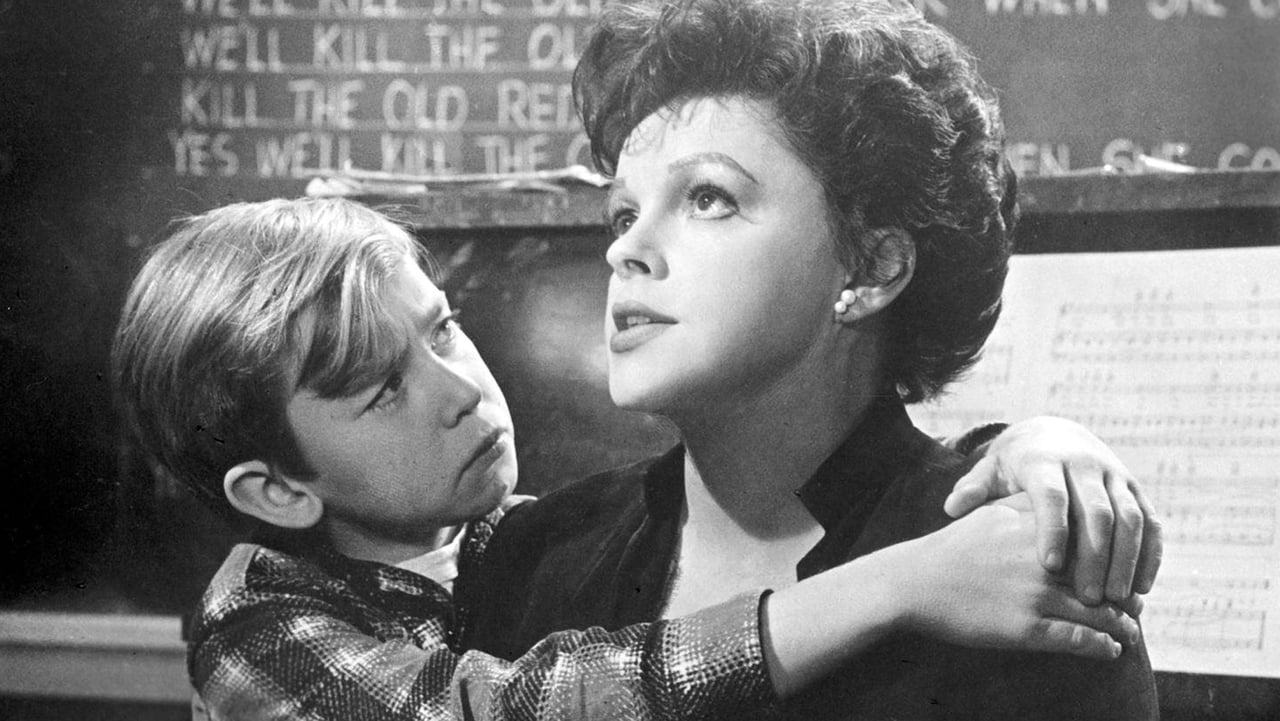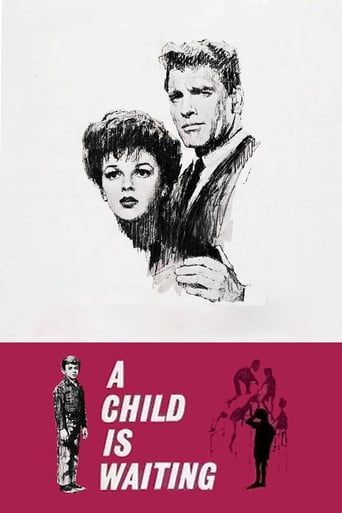

Purely Joyful Movie!
... View MoreAt first rather annoying in its heavy emphasis on reenactments, this movie ultimately proves fascinating, simply because the complicated, highly dramatic tale it tells still almost defies belief.
... View MoreExcellent characters with emotional depth. My wife, daughter and granddaughter all enjoyed it...and me, too! Very good movie! You won't be disappointed.
... View MoreThis movie feels like it was made purely to piss off people who want good shows
... View MoreBurt Lancaster and Judy Garland in a movie together? I couldn't imagine it either, but they worked really well together in A Child is Waiting. Burt plays the head of an institute for mentally handicapped children-which was really groundbreaking in the 1960s-and Judy is hired as the new music therapy teacher. Their perspectives differ constantly, and even though she has no prior experience teaching or dealing with disabled kids, she feels free to argue with him whenever she thinks he's wrong. Only the pint-sized dynamite of Judy Garland could challenge the great, hulking Burt Lancaster and get away with it!If you love Judy, you'll want to add this one to your list, so you can see her in a great dramatic role. Burt comes across as cold and harsh sometimes, but since he's always thinking of the children's best interests, it's great to see him in another multi-layered performance. I don't generally like stories that solely focus on the plight of children, but I was able to appreciate the acting, and the bold statement from Hollywood to address a subject like this at the time. If mental disabilities are a passion of yours, this is a must-see, since it's one of the earliest films to discuss them.
... View More"A Child Is Waiting" is a film showing the happenings at a state institution for developmentally delayed kids. Back in the bad old days, people were routinely sent to giant state schools to live out their lives. Not only the mentally retarded, but blind, mentally ill, deaf and various disabled adults and kids were routinely sent off to these places--and it was the rare case where they stayed home with their families. This warehousing of these 'defectives' was thought to be best and fortunately for most of these individuals, such mass institutionalization has become a thing of the past (though de-institutionalization offers its own set of problems as well). The school in this film isn't quite a warehouse (you do get to see one later in the film) but it's far from a homelike environment. So, when you watch this movie, understand that it was very typical for the early 1960s--but not today.Burt Lancaster plays a doctor who runs the institution in the film. In some ways, he's very likable and committed and in others he's a very hard individual. He hires a new teacher for the place--an inexperienced by well-meaning lady (Judy Garland). At first, things seem to go well but when the two disagree on how to handle a particularly troubled kid, sparks start to fly. This boy has been abandoned by his family and they never visit him--and Garland is determined to do something to get him to open up and become a happier and higher-functioning resident. She also wants to give her love to the boy. But for Lancaster, pity is not on his agenda--he wants to toughen up the kids--to force them to respond to his less cuddly ways.For me, the story about the one boy is not all that important. To me, what's important is the insight it gives in the treatment and education of developmentally delayed kids--and to show how it was done long ago. to psychology majors, those who work in the field or anyone who lives with and loves someone with developmental delays, it's well worth seeing. A very good film--and you might want to keep a box of Kleenex handy just in case.By the way, one of the kids in the institution was played by Billy Mumy--the same kid who later starred on "Lost in Space" and as an adult on "Babylon 5"--and played the scary kid with freaky powers on "The Twilight Zone". Barbara Pepper who played 'Doris Zipfel' on "Green Acres" plays one of the teachers. Also, Steven Hill plays the disturbed boy's neglectful and rather angry father. He played the original lead on "Mission:Impossible" as well as the original District Attorney on "Law & Order". Finally, this was one of Judy Garland's last films. In 1963, she made this as well as "I Could Go On Singing" before dying so tragically young.
... View MoreThis black/white film from the early 1960's, directed by John Cassevetes, had a powerful impact on me almost 50 years later. A semi-documentary, it is honest and respectful and never condescending in its treatment of children with intellectual challenges. Most of all, it shows how adults (teachers and parents) can change in their perceptions and attitudes, thus making it easier for the children to be happy and to learn. The movie stars Bert Lancaster as Dr. Matthew Clark and Judy Garland as Jean Hansen. Clark is the devoted director of a school for the special needs children; his methods are controversial, because he was ahead of his time. Unfortunately, he didn't suffer fools gladly and had little patience for the officials who visit his school. Hansen is a new member of the staff who comes to feel that she has failed. And she has... until Dr. Clark takes her on a tour of a group of adults whose sheltered lives have made them totally helpless. This lesson is a turning point for the thirty-something Miss Hansen, whose life has been a series of false starts. The father of one of the boys, Reuben Widdicombe, also comes to the realization that he can take a positive and hopeful approach instead of feeling sorry for himself.The movie is very instructive as we see people coming to grips with their lives and abandoning the stereotypes. Finally, the children in the movie are a joy to watch. There is a scene near the end where the children stage a pageant for the parents, behaving as children do in these performances and bringing great joy to the audience. There is a valuable lesson in this: there are no normal or abnormal children, only children.
... View MorePotentially dramatic exploration of the human heart is simplified into a standard-issue soap opera (with do-gooder trimmings). Judy Garland, shaky but determined, plays middle-aged woman working at a children's school for the mentally-challenged; she immediately gets on the wrong side of school principal Burt Lancaster, who seems to sneer at her ambition and gives her a good dressing-down. Garland bonds with a near-catatonic child with absentee parents, and we are immediately made aware this woman needs to fill a personal void in her life by taking care of others--providing a certain emotional pay-off upon discovering her vocation in life may be to teach these kids (and reach their parents). I didn't quite believe anything in "A Child is Waiting"; it leaves behind no evidence that director John Cassavetes' heart was in it, nor why these particular talents would want to be involved. The good intentions may hook some, but Cassavetes shows little of the arty obtuseness which would drive his later, more ambitious and personal films about shattered men and women. ** from ****
... View More